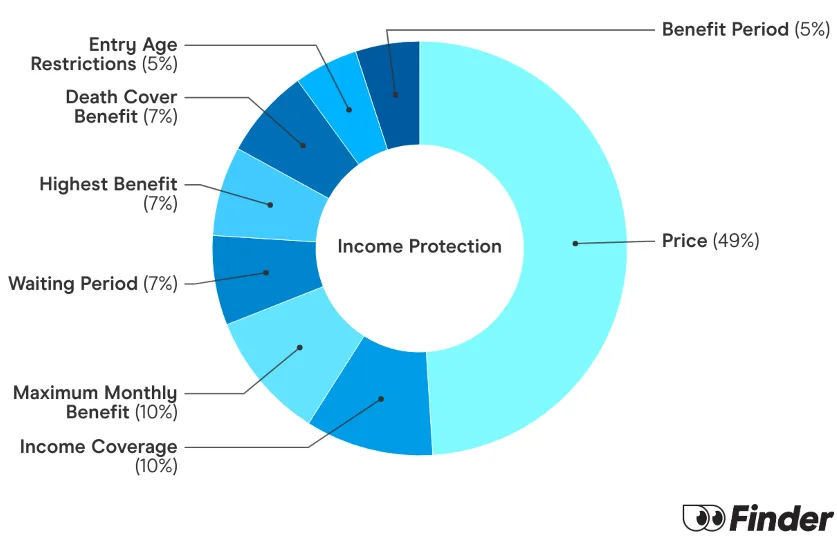Key takeaways
- Income protection can help pay your bills if you cannot work due to a sudden illness or injury.
- Income protection is super valuable if you do not have emergency savings.
- Even with savings, income protection may be important if you rely on a single income, have debts or are self-employed.
What does income protection offer me?
Income protection is an insurance policy you can take out that will pay you part of your income if you're unable to work because of getting sick or injured. Generally, income protection can pay out:
- Up to 90% of your income for the first 6 months after you stop working
- Up to 70% of you income after the first 6 months are over, up to your elected benefit period
Every fund offers different benefits and definitions of full and partial disability, which will affect what you can claim. Be sure to read the Product Disclosure Statement (PDS) carefully.
Finder survey: How many Australians have income protection insurance?
| Response | |
|---|---|
| I don't have any of the above insurance | 60.54% |
| Life insurance | 32.52% |
| Income protection insurance | 18.38% |
| TPD insurance | 14.32% |
When income protection is worth it
Put simply, if you would be in financial stress if you stopped earning your income today, you could probably benefit from income protection. This will be more likely if you have dependencies, debts, or if you rely on a single income. Here are a few examples:
- You have rent or mortgage repayments you couldn't cover without your salary
- You have a spouse, children or other dependants that rely on your salary
- You don't have enough savings to cover more than a few weeks of your regular expenses
- You're a sole trader or casual worker, without access to leave or paid time off
- You want the security of not having to rush going back to work if you're sick or injured
When income protection might not be worth it
There are few times when you might not need income protection.
No expenses of dependencies: If you have low or no expenses, dependencies or debts, you might not need income protection insurance.
Close to retirement: If you've only few more years in the workforce and have enough savings, your response to sickness or injury might just be to retire early.
Low salary: Income protection is most useful to people earning a lot. If you're on a low salary, you might not benefit from income protection. You could look at Total & Permanent Disability insurance instead, whichpays out if you become permanently unable to work, regardless of earnings.
These aren't the only groups who might not need income protection, and you may still benefit if you fall into one of these categories. You should speak to a licensed financial planner before making any a decision.

"If you incur expenses for medical reports required to support your income protection insurance claim, these costs can be tax-deductible. This includes any fees paid to obtain documentation proving your inability to work due to illness or injury. Make sure to keep all receipts and records of these expenses to claim them when filing your tax return."
How much savings do you need to not need income protection?
Unfortunately, Finder research finds most Australians have far less than 3 month's earnings in their savings. According to Finder's Consumer Sentiment Tracker data from July 2023, around 60% of Aussies have less than 3 months of savings. The full data is in the chart below.
Compare policies from Australian income protection brands
Compare other products
We currently don't have that product, but here are others to consider:
How we picked theseFinder Score - Income Protection
Income Protection is a little complicated and a lot overwhelming. That's why we made the Finder Score, to make it easier to compare Life Insurance products against each other. Our experts analysed over 12 products and gave each one a score rank out of 10.
But a higher score doesn't always mean a product is better for you. Your situation is unique, so your policy choice will be too. Don't think of Finder Score as the final word, but as a good place to start your life insurance comparison.

"My income protection policy is an insurance I hope I never have to claim on – I consider it to be a financial back-up in case something terrible happens. Is it essential? Probably not, but hopefully it will provide my family with some financial breathing space if and when we ever need it."
Frequently asked questions
Sources
More guides on Finder
-
HCF Income Protect Insurance
Wondering if HCF Income Protection Insurance is right for you? We break down what’s covered, what’s not and whether it offers good value.
-
TAL Income Protection Insurance review
Learn the built-in benefits of TAL income protection to understand how it could work for you. Compare features and get a quote today.
-
Sick leave Australia: What you’re entitled to and when
Find out why income protection is an important tool to combine with your entitled sick leave.
-
Cost of income protection in Australia
Income protection costs can range from around $50 to $160+.
-
Sole trader income protection insurance
Income protection for sole traders provides financial support, via a monthly payment, if you’re unable to work due to illness or injury.
-
Income Protection Insurance vs Mortgage Protection
Does income protection provide the same thing as mortgage protection? Read on and compare.
-
Suncorp Income Protection Insurance Review
Receive income cover for illness or injury with Suncorp Income Protection.
-
Income protection insurance calculator
Find out how much your income protection insurance policy will pay out in the event of a claim. Receive quotes for income protection and apply securely.
-
NobleOak Income Protection Insurance review
NobleOak has been offering personal insurance solutions direct to Australians for over 137 years. Discover the benefits and features available on the NobleOak Income Protection policy and make a secure enquiry for cover.
-
Best income protection, Australia
Looking for the best income protection insurance but not exactly sure where to start? Compare the Finder Awards 2025 insurance winners.


